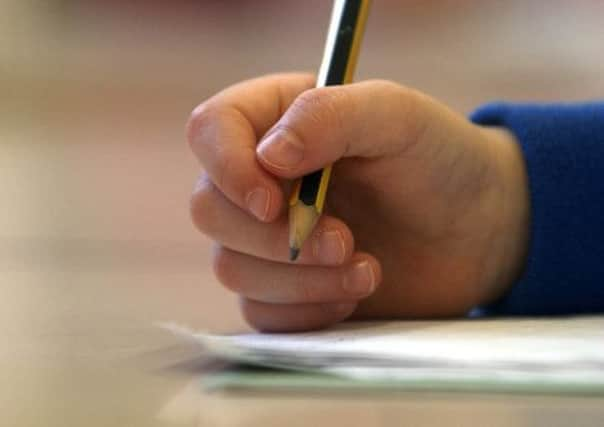Teenagers will have to master English and maths


Under new reforms, 16-year-olds who do not get a C grade or better will be told that they must learn the two subjects until they gain the key qualifications.
The Government said the move will help ensure that young people have a good grasp of English and maths.
Advertisement
Hide AdAdvertisement
Hide AdThe proposal was first put forward by Alison Wolf, the Sir Roy Griffiths Professor of Public Sector Management at King’s College London, in her 2011 review of vocational education.
At the time, she said it was “scandalous” that half of 16-year-olds were leaving school without good GCSEs in English and maths, and warned that it was a real failure of the education system that many of these youngsters would still not have these qualifications at age 18.
Prof Wolf’s report called for any teenager who did not get C grades in GCSE English and maths to continue with them post-16 as the two subjects are the “most important in the world”.
This recommendation was the “single most important”, Prof Wolf said yesterday, adding that she was “delighted” to see it being implemented.
Advertisement
Hide AdAdvertisement
Hide AdFigures show that among young people aged 19 last year, 285,000 had left school at age 16 without a C or higher in both English and maths, and by the time they were 19, 255,000 had still not reached this level, the Department for Education (DfE) said.
Around a fifth (21 per cent) of those who had not gained a good grade at age 16 in English continued studying it, along with 23 per cent of those who had not got a C or better in maths.
The reform will be introduced from the start of this term – which begins this week for many schools – and comes as the education participation age is raised to 17. In 2015 it will be raised to 18.
The DfE said that ideally, teenagers without C grades or higher in English and maths will continue studying for GCSEs in these subjects, although they can also take other qualifications such as functional skills and maths courses accredited by the exams regulator Ofqual as a “stepping stone” to GCSEs.
Advertisement
Hide AdAdvertisement
Hide AdThe English and maths results of 16 to 19-year-olds who did not gain these key GCSEs will also be reported in annual school league tables, the department said.
Education Secretary Michael Gove said: “Good qualifications in English and maths are what employers demand before all others. They are, quite simply, the most important vocational skills a young person can have. Young people must be able to demonstrate their understanding of these subjects.”
Prof Wolf said the move will have a “hugely positive impact on the ability of hundreds of thousands of young people to get good jobs”.
The change comes amid growing calls from a number of groups for all youngsters to continue studying maths after GCSE.
Advertisement
Hide AdAdvertisement
Hide AdMr Gove has previously said that within a decade, he wants to see the vast majority of teenagers studying maths up to age 18, and the Government is developing a new set of post-16 qualifications in the subject.
A poll published by the Sutton Trust last month found that 64 per cent of 11 to 16-year-olds in England and Wales were in favour of young people at school or college studying maths and English up to age 18.
At the moment, around one in five young people in England continue studying maths past the age of 16, compared with other developed nations where the majority of students continue the subject.
A DfE spokeswoman said the Government wants teenagers to “participate actively” in education and training.
Advertisement
Hide AdAdvertisement
Hide Ad“That is why we are planning to spend £7.4bn on education and training this year, giving every young person the opportunity to continue their studies and go on to skilled employment or higher education,” she said.
“We are funding all part-time study and increasing apprenticeship places, spending £833m this year to pay for more than 140,000 16-18 apprenticeships and for 40,000 small businesses to take on a young apprentice.”